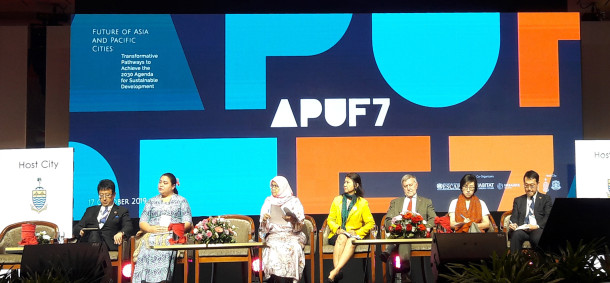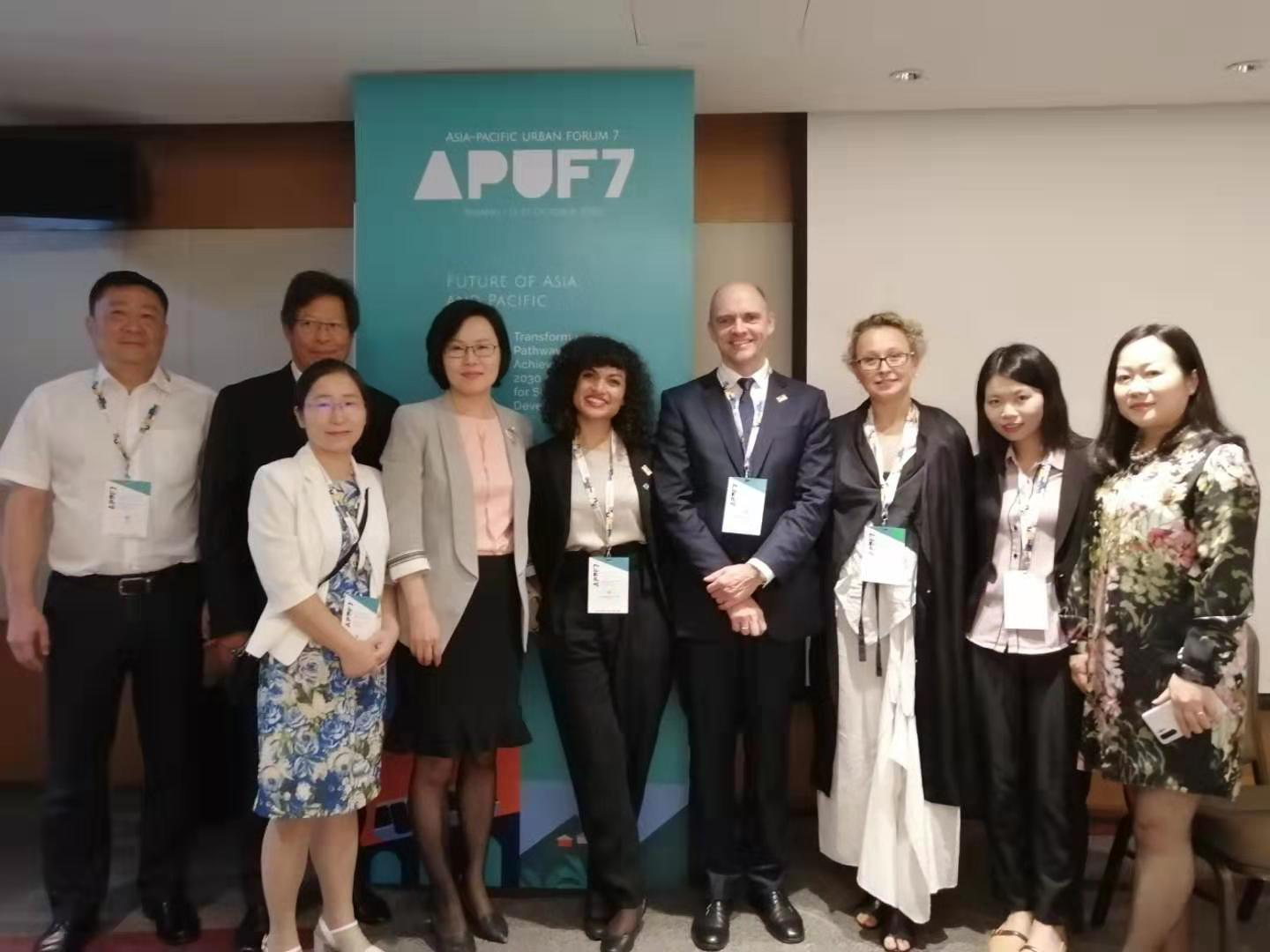
Three Asian-Pacific cases of urban innovation applied at the local level
APUF-7 displays experiences of communities and cities acting as catalysts of the SDGs
The 7th edition of the Asian Pacific Urban Forum (APUF-7) was held in Penang, Malaysia, from 15 to 17 October 2019. It was co-organized by UN-Habitat, URBANICE Malaysia and UNEscap and brought together over 3000 senior-level policymakers, financial development institutions, private sector, bilateral agencies, and international organisations. This 7th edition's suggested theme was "Future of Asia and Pacific Cities: Transformative Pathways to Achieve the 2030 Agenda for Sustainable Development" and its four main focus concerned: Data and Technologies for Smart Cities, Urban Finance, Urban Resilience, and Urban and Territorial Planning.
Over 60 % of the targets of the SDGs have to be addressed by cities and implemented at the local government's level. Metropolis and the People's Government of Guangzhou Municipality co-organised a session about innovative approaches to local problems, featuring cases from the cities of Guangzhou, Mezitli, and Malang. Guangzhou presented its Low Carbon Electric Bus, Mezitli detailed its initiative on women producers’ market and Malang discussed the ins and outs of its outstanding rewarded initiative “Water Banking Movement: Transforming Glintung Go Green from Flood Risk Area”. The objective of the session was to illustrate how these cities, at their local and community levels, found good collective solutions to solve their issues.
New ways of managing sustainability and mobility: Guangzhou’s Low Carbon Electric Bus
Ms. Ying Shen, Chief Engineer, Guangzhou Municipal Transportation Bureau, gave a thorough explanation of how the city of Guangzhou is implementing the new low carbon electric bus system. In an agglomeration of over 20 million inhabitants covering an area of 7000 km2, setting up a system able to tackle 6.13 million bus rides per day was a challenge. The bus company operates over 10000 buses with a dual investment system (public and private source of funding) and since it started, it has reduced its maintenance costs by 40%. As the next step, the city is looking at upgrading the entire taxi float into electric vehicle by 2022.
"It is about changing the entire way we manage mobility and sustainability" the director of the Guangzhou Institute for Urban Innovation, remarked Nicholas You, Advisor for the Guangzhou International Award for Urban Innovation (Guangzhou Award). "Innovation is about bringing people's needs first. The role of public sector is critical in providing public services and we have to recognize leadership at all levels whether the community level or the industry level", he added.
Mezitli women producers’ market
Mrs. Hurrem Betul Levent Erdal, Project Coordinator at Mezitli Municipality Mayor's Office, commented on how bringing women into the workforce can be challenging in countries with socially conservative traditions. Turkey is no stranger to that set of attitudes, but one city on the Mediterranean has shown exceptional political leadership to buck those trends. Mezitli, a coastal city of nearly 250,000 with some 60,000 registered Syrians, established a network of public markets specifically for women producers who grow agricultural products or make homemade goods from in and around the metropolitan area.
The programme has helped spark entrepreneurship among local women and also served as a teaching opportunity. The city offers business classes and training sessions as well as incentives to switch from plastic to glass or paper. As a result, this women’s empowerment programme also includes elements of economic development and environmental sustainability – an admirable combination of achievements for a single policy.
Water Banking Movement: Transforming Glintung Go Green from Flood Risk Area
Malang city has 5.5 percent of the city that is characterized by slum conditions covering 608 Ha. The slum settlements are largely inhabited by informal sector workers and are often vulnerable to flood and disease. Glintung community, with the support of Malang city, has demonstrated an environmentally-sustainable approach to addressing climate change challenges through collective action. The neighborhood leaders inspired a planned social environmental movement to transform Glintung from climate risk to a climate-resilient kampong through a participative approach. Malang city government integrated this social movement with the pilot project – Water Banking movement. The community initiatives included tree planting in the neighborhood, building catchment areas in every house, building vertical sky gardens, producing organic produce and integrating local cultural heritage. The technical solutions were provided by Faculty of Engineering, Brawijaya University, and local businesses provided a dedicated market for organic food products.
“This innovative community approach to building resilience to climate change and the green approach to local economic development are the main lessons learnt. The project has the potential to inspire other low-income communities and informal settlements worldwide to improve their living environment, engage in local economic development and improving food and nutrition”, said Mr. Pandu Zanuar, Spatial Planning Analyst, Malang City Secretariat mentioned, while explaining the genesis of the Water Banking Movement.
These outstanding projects demonstrated that innovation is a process in which social and gender dynamics have to be rearranged and the governance processes revised.
"Lasting changes will only be reached through our capacity to rethink governance models and systems" Nicholas You resumed echoing Mumania Sharif's conclusive remarks at the closing ceremony of APUF7: " The Urban Agenda fosters on actions to implement the SDGs. So, if you invest in data collection, make sure you have the right tool kit for sound decision making."
The Metropolis Senior Manager for Institutional relations & Asia portfolio, Agnès Bickart, traveled to Penang and was responsible for opening the session. She seized this opportunity to present the online educational training videos that Metropolis developed with the nonprofit EcoCity Builders, about the experience of the Milan Food Policy, one of the winning initiatives of the 4th Guangzhou Award last year. The next edition of the Guangzhou Award takes place in 2020, and applications will soon be open, and each local government can submit up to six different projects. The award ceremony will take place in Guangzhou on October 29, 2020. Click here for further information about the Guangzhou Award, and kindly contact Agnès Bickart for further inquiries about Metropolis Urban Innovation program.

